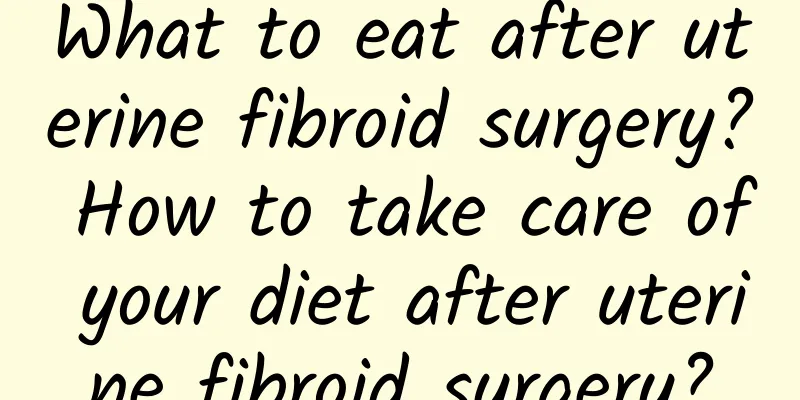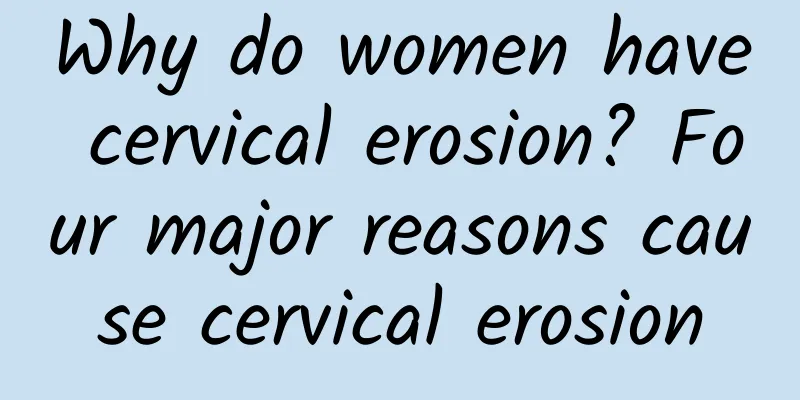What to eat after uterine fibroid surgery? How to take care of your diet after uterine fibroid surgery?

|
After uterine fibroid surgery, the recurrence of fibroids due to insufficient intake and utilization disorders of trace elements should be avoided. Long-term and excessive stimulation of estrogen should be avoided, hormone drugs should be used rationally, and nutritional supplements should be consumed less. More foods containing protein, vitamins and iron should be consumed. Patients with uterine fibroids should pay attention to their diet after surgery First of all, the eating time should not be too early. Generally speaking, patients should eat nutritious and easily digestible food 6 hours after surgery. On the first day, you should use a completely clear diet. You can eat some porridge oil (the skin of millet or rice porridge), thin lotus root powder, almond milk, etc., 6 to 8 meals a day. Do not give soy milk, milk and other foods that easily cause flatulence. On the 2nd to 3rd day, you can add some nutritional powder (such as protein powder, complete nutritional powder, etc.) to the porridge oil, or eat some thick rice soup, chicken soup, egg drop soup, rice soup and eggs. On the 3rd to 4th day, you can transition to a thick diet, such as rice porridge, tofu brain, beef soup, egg soup, and vegetable puree soup, and you can add some meat floss, minced meat, etc. One week after surgery, you can gradually switch to a semi-liquid diet, such as chicken noodle soup, pork rib noodle soup, vegetable juice stewed noodles, and small wontons, and gradually transition to soft rice or ordinary rice. It is best to use small meals to increase nutritional intake. What to eat after uterine fibroid surgery? What to eat after uterine fibroid surgery? The diet of patients after uterine fibroid surgery should not be too refined. After uterine fibroid surgery, the nutrition must be comprehensive. High-protein, high-vitamin, low-fat and low-salt diets, spicy, fat, sweet, greasy, barbecued, pickled and other foods should be avoided as much as possible. Usually, eating regularly and quantitatively, having a reasonable nutrition and a regular life are the key factors to help recovery after surgery. 1. The immunity of patients after surgery is low. At this time, they need certain nutritional supplements most to meet the needs of body growth and recovery. Therefore, it is necessary to choose some nutritious and easily digestible foods, such as milk, eggs, eggs, pork, fish, tofu, etc. At the same time, remember to supplement vitamins and absorb nutrients from foods such as animal liver and spinach. 2. High fat means an increase in estrogen secretion. Therefore, patients with uterine fibroids should always adhere to a low-fat diet and eat more high-fiber foods after surgery. You can eat more lean meat, eggs, quail eggs, asparagus, celery, spinach, cucumber, winter melon, mushrooms, tofu, kelp and various fruits. In addition, you can eat some grains such as corn and potatoes appropriately. 3. For the elderly and the weak, the time for eating liquid and semi-liquid foods should be appropriately extended to promote digestion, such as lotus root powder and orange juice, or choose lean meat or fresh fish to make soup, which can not only ensure nutrition, but also increase appetite, thereby recovering quickly. 4. If you have anemia, eat more foods high in iron, such as pork liver, black sesame, grapes, seaweed, wolfberry, mushrooms, etc. 5. Eat more foods that fight uterine fibroids. Eat more carrots, purple cabbage, pumpkin, oranges, corn, etc. β-carotene foods; eat more foods rich in lycopene, such as red grapefruit, red pepper, tomato and strawberry; eat more foods rich in folic acid, such as spinach, sunflower seeds and wheat germ; eat more sea buckthorn, fresh dates, lemons, kiwis, broccoli and bell peppers rich in vitamin C. Foods have a certain effect on uterine fibroids. 6. Uterine fibroids are easily stimulated by estrogen, so large amounts of estrogen should be avoided after surgery. In addition, supplements should not be taken too much after uterine fibroid surgery, and nutritional supplements are suitable for patients to take for a period of time after their condition stabilizes. A balanced diet and balanced nutrition are best. 7. Regular and quantitative eating can develop good eating habits, which is conducive to the rapid recovery of the body of patients with uterine fibroids. Excessive overeating may increase fat content in a short period of time, secrete estrogen, threaten uterine health, and bury the possibility of recurrence. What can’t you eat after uterine fibroid surgery? Uterine fibroids should have a light diet, and should not eat mutton, shrimp, crab, eel, salted fish, black fish and other hair. Avoid spicy foods, such as pepper, pepper, onion, garlic, white wine and other foods and drinks, which will prolong the body's recovery time. Therefore, uterine fibroid patients should not eat some hot, blood-clotting, hormone-containing foods, such as longan, jujube, royal jelly, etc., after surgery, which is not conducive to postoperative physical recovery. 1. Donkey-hide gelatin. Donkey-hide gelatin has the effects of nourishing blood and yin, moistening dryness and stopping bleeding. To prevent ischemic necrosis of uterine fibroids, patients should fast. 2. Royal jelly. Royal jelly contains a certain amount of estrogen. The occurrence of uterine fibroids is related to the level of estrogen. If patients with uterine fibroids take estrogen, it will affect the growth of uterine fibroids and aggravate the condition. 3. Red dates. Red dates have a sweet taste and belong to the spleen and stomach meridian. They have the functions of replenishing qi, nourishing blood and calming the mind, and relieving the medicinal properties. However, the blood-replenishing function of red dates can stimulate the growth of uterine fibroids and accelerate the growth of uterine fibroids. Therefore, patients with uterine fibroids should not eat them, otherwise it will not help their condition. 4. Longan. Longan has the effect of replenishing qi and nourishing blood, which can increase the blood flow of uterine fibroids, provide more nutrients for their growth, accelerate the growth of fibroids, and aggravate the patient's condition. 5. Peanuts. The vitamin K in peanuts has a hemostatic effect and has a good hemostatic effect on a variety of bleeding diseases. However, patients with uterine fibroids should not eat peanuts. The hemostatic and coagulation functions of vitamin K can cause coagulation in uterine fibroids, leading to ischemic necrosis of uterine fibroids. Women with uterine fibroids are not suitable for eating foods with hot tonic effects, whether they are tonics or medicated foods, especially the common Chinese herbal tonics such as Shiquan pork ribs soup, Siwu chicken, Bazhen soup, ginger duck, and mutton hotpot. They should avoid eating them to prevent excessive nourishment, which will cause the fibroids to absorb too much nutrition, resulting in pathological changes and increased possibility. |
>>: What are the symptoms of uterine fibroids? How much is the cost of treating uterine fibroids?
Recommend
What are the specific symptoms of pelvic inflammatory disease?
The incidence of pelvic inflammatory disease is g...
How much hcg is considered an ectopic pregnancy
Ectopic pregnancy is a serious abnormal pregnancy...
The National Health and Family Planning Commission first introduced 6 tips for "My Plate", eat smart and get nutrition!
According to a recent survey by the National Heal...
What are the common symptoms of cervicitis in women? What tests should patients with cervicitis undergo?
Question: If I feel unwell and suspect I have cer...
What are the symptoms of irregular menstruation?
What are the symptoms of irregular menstruation? ...
Common causes of pelvic inflammatory disease in women
Pelvic inflammatory disease mainly refers to a gy...
What causes ectopic pregnancy?
Ectopic pregnancy is usually called ectopic pregn...
What causes cervicitis and how to treat it
Cervicitis refers to an inflammation of the cervi...
Can Bartholinitis Affect Life Expectancy?
As the diseases around us continue to increase, w...
What are the minimally invasive treatments for uterine fibroids?
Minimally invasive treatments for uterine fibroid...
How to determine whether there is an ectopic pregnancy
How to determine whether there is an ectopic preg...
How to treat chronic cervicitis in women? Pay attention to these matters when treating chronic cervicitis
Chronic cervicitis is a common disease among wome...
What to eat for uterine adnexitis
What foods are good for treating adnexitis? Befor...
No.1 milk and honey for relieving dysmenorrhea
Abdominal pain, bloating, nausea, dizziness, pale...
There is a science to walking~6 exercises to strengthen muscle fascia connection and be more graceful
I really like to observe the coming and going of ...









